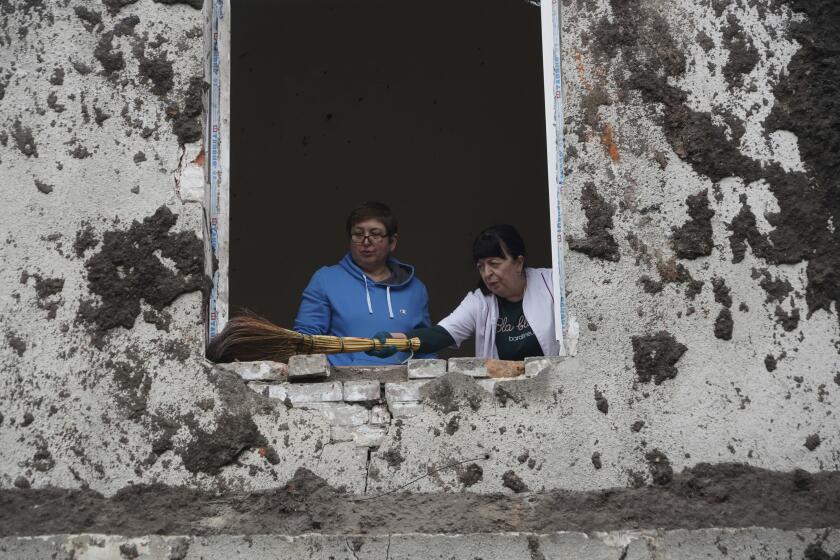Peace Brokers to Set Up Palestinian Aid Conduit
U.S. officials, under heavy pressure from fellow Middle East mediators, agreed Tuesday to the creation of a trial emergency channel for funneling humanitarian aid to the Palestinians, while keeping a funding freeze on the Hamas-led Palestinian government.
The United States, Russia, the European Union and the United Nations -- a group of peace brokers known as the quartet -- said the new “international mechanism” was meant to alleviate a shortage of medical supplies and other critical goods without supporting the newly elected government.
The EU will set up the channel, which will be reviewed after three months. Funding will go through institutions such as the World Bank and the U.N.
U.S. Secretary of State Condoleezza Rice had urged other nations to maintain a hard line against Hamas, a militant group whose charter calls for the destruction of Israel and which the U.S. considers terrorist. But after strong lobbying, she said Washington would support the launch of the aid channel without contributing to it.
“The goal is not to transfer responsibility for meeting the needs of the Palestinian people from the government to the international community,” Rice said at a news conference with the other officials after their meetings.
“It is to provide assistance to the Palestinian people so they do not suffer deprivation,” she said.
Rice said the U.S. would separately provide $10 million in medical aid through UNICEF and in-kind donations.
In a meeting with quartet officials Tuesday morning, foreign ministers from Egypt, Jordan and Saudi Arabia warned of civil war among Palestinians if the Hamas government collapsed. The World Bank reported Monday that the humanitarian crisis appeared far graver than expected after international aid was frozen in March, and it warned of a breakdown in law and order, health services and education if help didn’t arrive.
Before Hamas won parliamentary elections in January and subsequently took control of the Palestinian Authority except for the presidency, foreign aid accounted for more than half the government’s $1.9-billion annual budget. But the EU and the U.S. said they would not continue to provide funding unless Hamas recognized Israel, denounced terrorism and committed itself to the quartet’s blueprint for peace.
Hamas has refused, and the aid cutoff has hit the Palestinian economy hard. The authority’s 165,000 employees have gone without a paycheck for two months because the government is broke.
When Hamas took over, it inherited severe financial problems from the government led by the Fatah movement of Palestinian Authority President Mahmoud Abbas.
The money crisis worsened significantly after Israel suspended the transfer of about $50 million in tax and customs duties it collects on behalf of the Palestinians, and the U.S. and EU froze direct aid.
Hamas leaders say fear of U.S. sanctions has kept Arab banks from transferring more than $70 million in donations from Arab countries.
However, that sum wouldn’t cover the payroll for even a month: The tab runs about $116 million.
The suspension of paychecks sent thousands of Palestinians into debt and dealt a fresh blow to the already struggling economy.
The crisis has exacerbated shortages of some medical supplies and other goods, which had already been affected by frequent Israeli closures of the main cargo portal into the Gaza Strip.
International aid agencies have warned of a humanitarian crisis and the possible collapse of the Palestinian Authority unless the situation improved.
Officials at Shifa Hospital, the largest medical facility in Gaza, said Tuesday that reductions in dialysis treatments due to a medication shortage had contributed to the deaths of four patients.
Palestinian Authority Prime Minister Ismail Haniyeh, a Hamas leader, on Tuesday urged the West to end the aid cutoff.
“You have to reexamine your hasty resolutions, which opened a siege against the Palestinian people, and you have to come out with decisions that are going along with humanity,” Haniyeh said at a gathering of about 100 university professors and others who visited his office in Gaza City to show their support.
“The quartet today has to ... stop the policy of dictation and pressure, which the American administration is imposing on the world,” Haniyeh said.
*
Farley reported from the United Nations and Ellingwood from Jerusalem.
More to Read
Start your day right
Sign up for Essential California for news, features and recommendations from the L.A. Times and beyond in your inbox six days a week.
You may occasionally receive promotional content from the Los Angeles Times.





